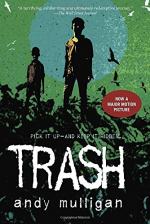|
This section contains 710 words (approx. 2 pages at 400 words per page) |

|
Trash
Trash serves as a symbol that represents the existence of the children in the novel. As people who grow up in the dumpsite, their lives are difficult to disassociate from the trash they pilfer through, and their lives revolve around what they find and do not find. Trash is how people outside Behala perceive them as well, with the police reminding Raphael that his existence is nothing more than that of a dumpsite boy, while Father Julliard realizes the same thing but still shows compassion.
Stuppa
The word for human waste, stuppa, represents the condition of the city as a corrupt place in the third-world. Since the majority of the city does not have access to modern toilets, they dispose of their waste through the trash that ends up in places like Behala. But it also points to the corruption of the city, as the rich...
|
This section contains 710 words (approx. 2 pages at 400 words per page) |

|




